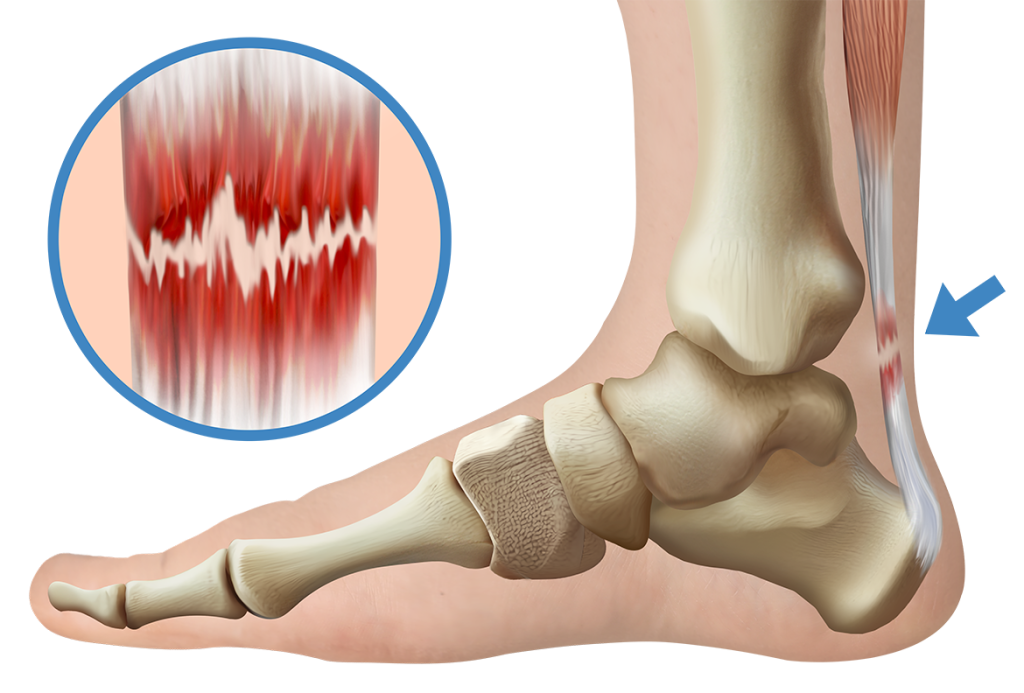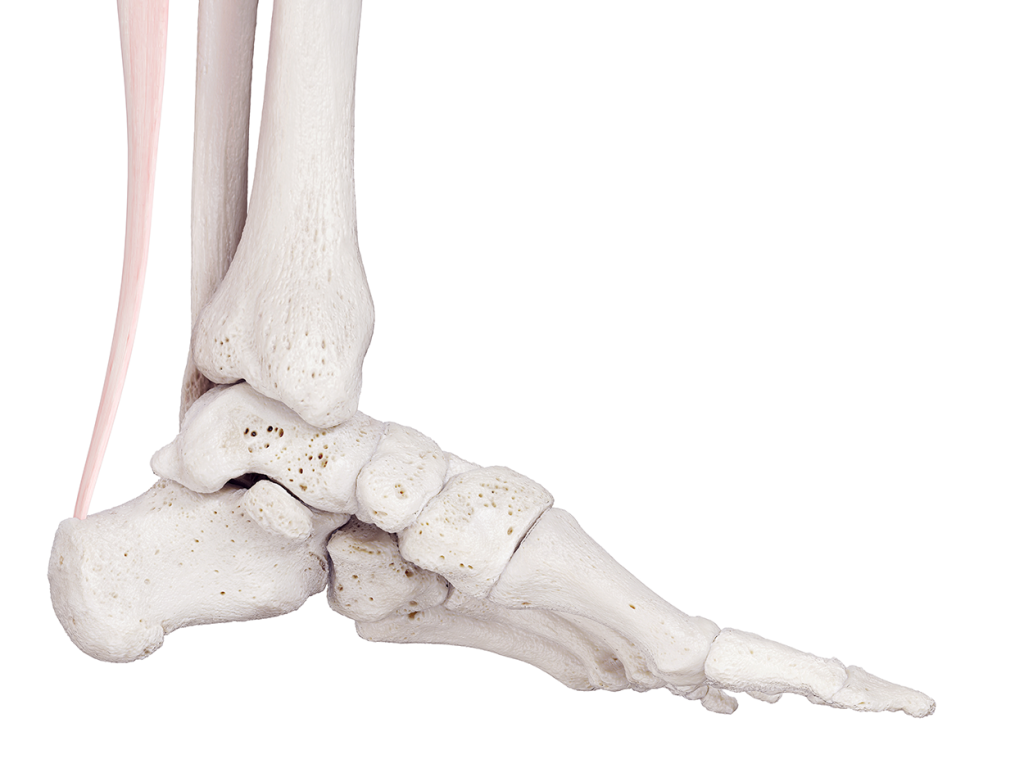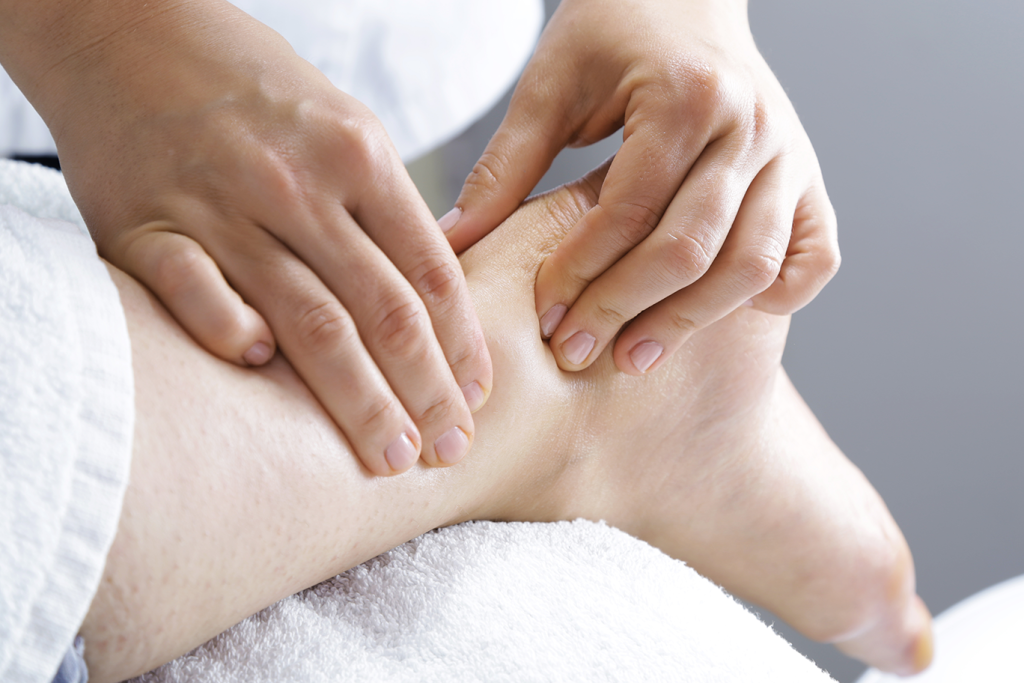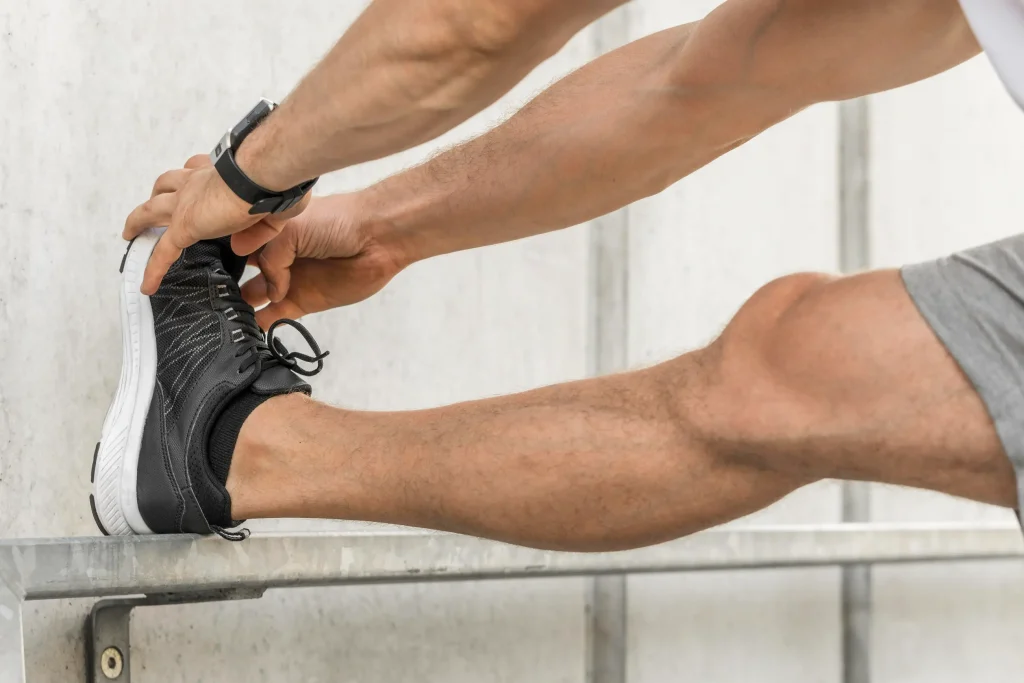Achilles tendon rupture: causes, treatment and healing
What is an Achilles tendon rupture?
A rupture of the Achilles tendon is a common injury, especially in middle-aged men who play recreational or competitive sports. The injury is usually caused by a sudden overloading of an already weakened tendon.

What is the Achilles tendon?
Anatomy of the Achilles tendon
The Achilles tendon, also known as the tendo calcaneus, is the strongest and thickest tendon in the human body.
It connects the calf muscle to the heel bone (calcaneus).
More precisely, it is made up of the tendons of the gastrocnemius muscle (twin calf muscle) and the soleus muscle (clod muscle), both of which are located in the lower leg.

Structure
- Gastrocnemius muscle: This muscle has two heads (medial and lateral) and is responsible for flexion of the knee and plantar flexion of the foot (movement of the foot towards the sole of the foot).
- Musculus soleus: This muscle lies under the gastrocnemius muscle and also contributes to plantar flexion, but is mainly active when the knee is flexed.
- Connection with the calcaneus: The Achilles tendon connects these muscles with the rear part of the calcaneus and thus enables the transfer of force from the calf muscles to the foot.
Function of the Achilles tendon
The Achilles tendon plays a central role in many movements, especially when walking, running, jumping and climbing stairs. Its main functions include:
- Plantar flexion: The Achilles tendon enables plantar flexion of the foot, which is essential for pushing off from the ground when walking or running.
- Shock absorption: It acts as a shock absorber and helps to cushion the loads that act on the foot.
- Power transmission: By connecting the powerful calf muscles with the heel bone, it ensures efficient power transmission, which is necessary for locomotion.
Special features
- Strength and resilience: Despite its enormous resilience – it can withstand forces up to 12 times the body weight – the Achilles tendon is susceptible to injury and degenerative changes due to its poor blood supply.
- Weak points: A known weak point is about 2-6 cm above the base of the heel bone, where blood flow is poorest.
The Achilles tendon is an essential part of the human musculoskeletal system and enables central movement sequences such as walking, running and jumping. However, its anatomy and function also make it susceptible to various injuries and diseases that require targeted treatment in order to restore full functionality.
If you have problems with the Achilles tendon, please also visit my article on other Achilles tendon problems and pain.

Causes of an Achilles tendon rupture
An Achilles tendon rupture can be caused by several factors. The most common triggers include explosive movements, such as a sudden push-off or a strong pull, which are particularly problematic if the tendon has already been weakened by repeated microtraumas. Tendon weakening can also be caused by certain medications such as fluoroquinolones, statins or steroids. In addition, local cortisone injections or age-related degenerative changes increase the risk of a tear.
Main causes of Achilles tendon rupture
- Explosive movements (e.g. sudden kick)
- Repeated microtraumas
- Drug influences (fluoroquinolones, statins, steroids)
- Local cortisone injections
- Degenerative changes in the tendon
Symptoms of an Achilles tendon rupture
The symptoms of an Achilles tendon rupture are often clear. Patients frequently report a sudden, sharp pain in the area of the Achilles tendon, accompanied by an audible “whip crack”. In most cases, mobility is severely restricted and there may be a visible dent in the course of the tendon.
Main symptoms of Achilles tendon rupture:
- Sudden, sharp pain
- Audible "crack of the whip"
- Visible dent along the Achilles tendon
- Restricted mobility

Treatment methods for Achilles tendon ruptures
An Achilles tendon rupture can be treated either conservatively or surgically. The choice of method depends on various factors, such as the age of the patient, the level of activity and the extent of the injury.
Conservative treatment
Conservative therapy is often used for older patients or for partial tears. It consists of immobilizing the foot in a special shoe that relieves the Achilles tendon.
- The foot is initially held in a pointed foot position (30°) to bring the tendon ends into contact.
- After four weeks, the position is gradually adjusted (20°, then 10°).
- The therapy takes about eight weeks in total.
The advantages of conservative treatment are the avoidance of surgical risks. However, there is an increased risk that the tendon will rupture again or that a prolonged healing period will impair the strength of the calf muscles.
Summary of conservative treatment:
- Suitable for older patients or partial tears
- Immobilization in a special shoe for 8 weeks
- Risk of recurrence or muscle atrophy
Surgical treatment
Achilles tendon surgery is the preferred method, especially for young, active patients or in the case of complete tears. It allows the tendon ends to be directly connected and functionality to be restored more quickly.
- Minimally invasive procedure: The tendon is sutured through small incisions in the skin.
- Reconstructions: In the case of old or complicated tears, material from other tendons, such as the flexor tendon of the big toe, can be used.
Surgical treatment has a lower recurrence rate than the conservative method. Nevertheless, complications such as wound healing disorders can occur, especially with open surgery.
Summary of the surgical treatment:
- Preferred for young or active patients
- Faster healing and lower recurrence rate
- Risk of wound healing disorders

Risks and complications
Risks and complications
A rupture of the Achilles tendon carries risks that depend on both the injury itself and the treatment chosen:
- Wound healing disorders: Especially after open surgical procedures.
- Recurrent rupture: In about 20% of conservatively treated cases, a new rupture occurs.
- Muscle atrophy: Without adequate rehabilitation, the calf muscles may weaken.

FAQ: Frequently asked questions about Achilles tendon ruptures
What to do if the Achilles tendon is torn?
If a rupture of the Achilles tendon is suspected, a doctor should be consulted immediately. Rapid diagnosis and treatment are crucial for successful healing.
If you think you have torn Achilles tendon, do not refuse to contact me.
How long does it take to heal an Achilles tendon rupture?
The healing time depends on the treatment method:
- Conservative therapy: 12-16 weeks until full weight bearing.
- Surgical treatment: 8-12 weeks until resumption of normal activities.
Can the Achilles tendon rupture again after surgery?
Yes, there is a risk of a new tear, especially with improper rehabilitation or renewed overloading.
How is a partial tear of the Achilles tendon treated?
A partial tear is often treated conservatively. However, a surgical solution is advisable for more severe injuries.

Conclusion
An Achilles tendon rupture is a serious injury, but it can be treated well with the right treatment methods. Whether conservative or surgical – the choice of treatment depends on individual factors. It is important to consult an experienced doctor at an early stage in order to initiate the best possible therapy.
If you or your loved ones are struggling with Achilles tendon problems, don’t hesitate to contact us. With years of experience and modern treatment methods, I can help you get back on your feet quickly.